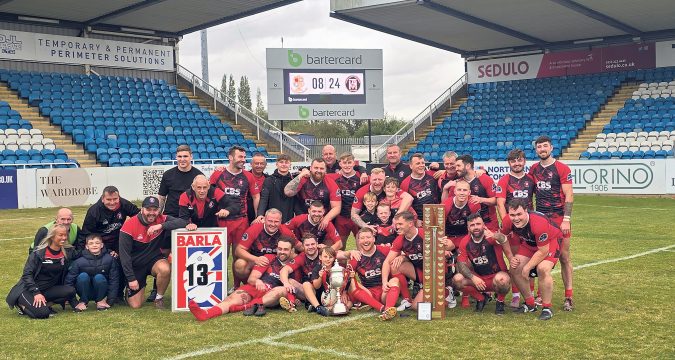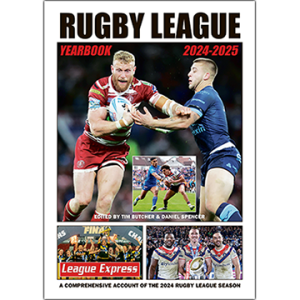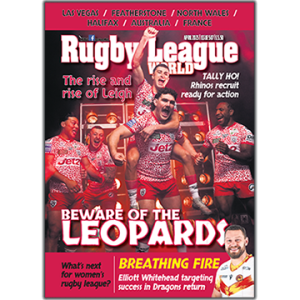
THE first thing that stood out for me, in the second round of the BARLA National Cup, is that holders Thatto Heath Crusaders and last year’s runners-up Orrell St James both won.
Thatto beat St Helens neighbours Pilkington Recs and Orrell St James prevailed at Westhoughton Lions, both by comfortable margins, in ties played on Thursday evening. That suggests a repeat of the 2024 decider can’t be ruled out when the final takes place in early November.
Who the Crusaders and the Saints will meet in the third round (quarter-finals) on the August Bank Holiday weekend has yet to be determined, the draw having not yet been made (BARLA has, so far, still to announce the date for that) but whoever gets paired with either side will clearly have a job on.
Sadly, there were three ‘walkovers’ in the weekend’s eight ties, with 18-0 results registered against Folly Lane (at Sharlston Rovers), Wigan St Judes (at King Cross Park) and Wigan St Patricks (at Woolston Rovers).
That’s very unfortunate and another indication, perhaps, of the Bank Holiday blues that seem to affect team sports these days, and to which I referred last week. Let’s hope there are no repeats in the quarter-finals.
Those blues appear to have also affected the semi-finals of the Barrow and District League’s Barton Townley Cup, with Ulverston conceding Saturday’s tie against Millom at the Northern Competitions Stadium (aka Craven Park).
The Woolybacks are therefore through to the final (which is also scheduled for Barrow Raiders’ grand old stadium in another August Bank Holiday special), where they will meet Dalton, who edged Hindpool Tigers in the game that actually went ahead in what should have been an enthralling double-header.
There were no such blights surrounding the Oldham and District League’s Standard Cup final, in which Waterhead Warriors eventually saw off St Annes in a pulsating affair played out before a big Boundary Park crowd.
The Barton Townley and Standard Cup finals are, I’d say, the most prestigious of local deciders in the grassroots and I’m very grateful to veteran journos Paddy McAteer and Roger Halstead for sending reports to me.
The President’s Cup got off to a grand start on Wednesday when holders England Universities beat Great Britain Teachers 26-16.
This year’s competition is a three-team affair, with Great Britain Police having not entered this time for procedural reasons and UK Armed Forces due to play the Teachers next month.
The Students’ manager David Butler, who kindly submitted a match report, made the point that his team only beat the Teachers by eight points last year. There’s clearly very little between the two teams, which I suppose is one of the strengths of the President’s Cup in its relatively recent guise.
I’m looking forward the clash between the Armed Forces (who are unable to yet name their squad, given global concerns) and the Teachers, which will be played at Orrell St James on Wednesday, May 14.
And I’m also awaiting with keen anticipation the tri-series’ closing game, when the Students and the Armed Forces will meet in London, at a venue yet to be announced. Let’s hope all the games are as closely contested as last week’s was.
An ongoing issue for as long as I can remember during the decades I’ve covered the grassroots game is the way that professional clubs pillage amateur sides in their pursuit of young talent.
There’s nothing wrong at all, of course, in Betfred Super League outfits (or, for that matter, those in the Championship or League One) giving young players the chance to progress as far as they can in Rugby League.
Indeed, I’d say they have an obligation to do just that. But it doesn’t always quite work out that way, does it?
Let’s nail the situation – which hails back throughout the sport’s history – shall we?
Professional clubs want to sign the best players they can, and for as little outlay as possible. Again, there’s nothing intrinsically wrong with that. It’s the nature of business, after all.
At the same time, ambitious young players (not to mention their parents or guardians) want to further their careers as far as they can.
Where it goes wrong, and has done for far too long, is when the professional outfits simply trawl through amateur teams, taking just about every player regardless of whether they genuinely think they will make it or not, leaving a wilderness behind.
Any farmer (or anyone who, as a child, learned at school that land should be nurtured not ravaged) will tell you that’s not only wrong, but plain stupid.
Why the Rugby Football League consistently fail to get a grip on this is absolutely beyond me. After all, even if those at the Etihad don’t give a stuff about the amateur game – which I do not think for a moment is the case – they should appreciate that without the grassroots, there is no professional game.
As such, professional clubs should not be allowed to destroy what ultimately sustains the entire sport in this country.
I was reminded – yet again – of all this when I bumped into a friend of mine last week who has long been involved with a leading National Conference League outfit. He reiterated concerns which have been made to me, by many others, over the years.
And I somehow suspect that if nothing is done to resolve the matter (and on past performance I can’t see that happening) the same worries will be expressed to me 20 years from now, if I’m still alive to listen that is and (more importantly) if we still have a game.
I’m sick and tired of blokes whose views I respect telling of how lads come back to them from Academies ruined (if they come back at all) by, all too often, tick-box coaching.
And don’t get me started on the Scholarships, which were never meant to be ‘playing’ competitions and which have further undermined our amateur clubs which, if those at our governing body were more (or at all) prudent, would be left to get on with a job they generally do very well, which is producing as many players as possible and, perhaps with the help of local professional clubs, making them as good as they can be.
Perhaps this is another issue I can raise with Nigel Wood once he’s got his foot under the table.
Meanwhile a thought occurred when I was watching the cracking televised Super League games on Good Friday, when commentators discussed the dismissal of Hull FC’s Cade Cust in the derby with Hull KR, and the sinbinning of Wigan’s Sam Walters, both for high tackles which, as several rightly said, wouldn’t have been sanctioned at all back in the day.
I know where they were coming from and I agree with the general sentiment, which is that we’re in different times and that’s how it is now.
It’s an issue that mainly affects the professional game, but there could also be an impact at amateur level. My thought is – if the current approach continues, it could very well be possible for so many players to be red or yellow carded that a team could be reduced to eight, and then what? The match would have to be abandoned, I think.
I wonder whether that’s where we are headed? It’s not beyond the bounds of possibility, is it?




